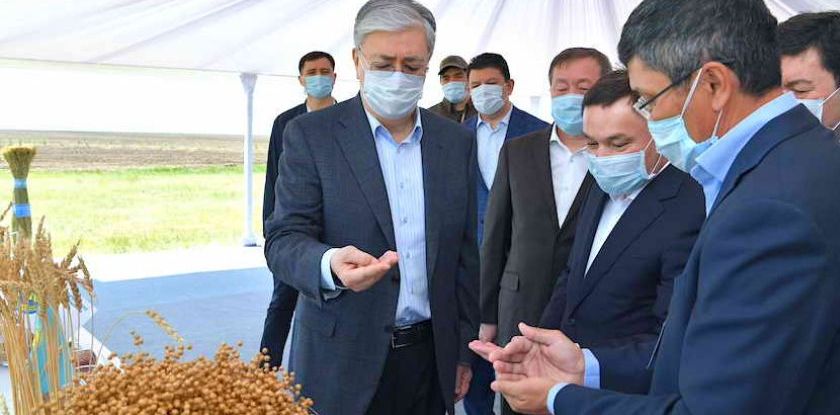One of the problems tormenting Akorda and the “super-presidential” power vertical lies in developing a new agricultural policy. One can learn about the particulars of the process from the Kazakh press.
For instance, we recommend reading Forbes-Kazakhstan’s article titled “Investments in Agriculture: 500 Billions into a “Black Hole” that meticulously describes the positions of the main players in this sphere of the national economy and the background of the problem.
In our opinion, all the current suggestions including those of –
- the Ministry of Agriculture (to dramatically increase the funding of the industry thus increasing the production and export of food commodities as well as substituting the import of the main types of the latter,
- the Association of Kazakhstan’s Farmers and the Alliance of Agricultural Associations of Kazakhstan (to maximally simplify the access to financial resources for entrepreneurs, to reshape public investments in the field via annulling governmental grants and starting investing resources in the projects that have a chance of becoming a foothold for an accelerated development)
are, simultaneously, good and bad.
Why do we think so?
Because, even though Kazakhstan’s agricultural industry is not too big in terms of its size, it is spread across a very large area: suffice it to say that the average population density in the country constitutes less than 7 people per square kilometre.
Add to this the low level of income and, therefore, expenses of most Kazakh citizens. For instance, according to the Bureau of National Statistics of the Agency for Strategic Planning and Reforms, in 2019, cash disbursements of households constituted only 55791 tenge per capita.
Apart from that, Kazakhstan’s agricultural complex is extremely multifaceted. It includes not only the modern vertically built agricultural corporations, farms and private businesses but numerous subsidiary farmings, individual farms and very large estates as well.
For this reason, any attempt to work out a single agricultural policy for Kazakhstan is doomed to fail. To prove it, let us recall the futile efforts of the Ministry of Agriculture that has changed its approach, tactics and practices several times for the past couple of decades. Albeit, in vein.
We at KZ.expert believe that the time has come to realise that Kazakhstan’s agricultural industry exists only on paper. In fact, it is but a collection (if not a snake pit) of all kinds of business units each of which wants to survive and, if they are lucky, to make some money. And each of these business units represents someone’s interests. Therefore, any attempt to mould these business structures into a single column and lead it to wherever the government wants are going to fail.
With that, we would like to point out that, nowadays, Akorda cannot use the repressive mechanisms employed by the USSR in the 1920-1930s to solve the food supply problem. Nor can it adopt the best practices of the developed countries due to the low level of personal income, the sector’s inability to be competitively viable, the low capital/labour ratio, the low labour productivity etc.
Finally, by prohibiting foreign citizens from purchasing and leasing farmlands, Kossym-Jomart Tokayev (or rather the Kazakh ruling top) has mothballed this catch-22 situation for years to come.
In these circumstances, one may develop any grand plans and give any number of generous promises for it isn’t going to make any difference. For this reason, there is little point in examining the best foreign practices. Kazakhstan will be able to copy them on the level of individual projects only; at best – on the level of individual sectors of the industry or individual regions.
So, given all this, what can be done?
In our opinion, Akorda’s only sensible solution under these conditions lies in decentralising the state agricultural policy which will include decentralising the system of the sector’s management. To do so, they will only need the political will of the ruling top since the rest of the players are likely to support the idea in the hope they will be able to make some money out of it.
In particular, they should eliminate all the structures of agricultural state support operating in the country today and build a network of quasi-governmental structures consisting of several inter-regional and specialised corporations instead.
With that, the former should continue doing what is already being done, however, all the decisions should be made by the corporations. Whereas the latter, through governmental investments, should create new export-oriented industries.
There can be no doubt that these corporations will suffer from the same “diseases” as the government of Kazakhstan, the Ministry of Agriculture and all kinds of agriculture supporting governmental structures are suffering from today. It simply cannot be avoided.
However, the inter-regional corporations will have an important advantage – the level of decision-making will be lowered and get closer to those actually engaged in the agricultural business, territorially and bureaucratically. And this would be a very significant improvement since, apart from everything else, it would encourage the competition for governmental funding and support among the players.
The specialised corporations will have another important advantage – they will concentrate on a single business that, among other things, will operate within a limited area.
We have no doubt that the Ministry of Agriculture is not going to be too pleased with this idea due to the simple reason that it will lose a part of the budget inflows and shed a number of its authorities if this plan is implemented.
Nonetheless, in our opinion, given the existence of the authoritarian political system and the “super-presidential” vertical, this is the only solution for reforming the agricultural sector that has a chance of working (may be not 100% chance but say 40-50%). Not to mention the political immaturity (if not stupidity) of the ruling elite that is holding on to the vast land parcels that have fallen into its lap and is unwilling to look further than tomorrow.




